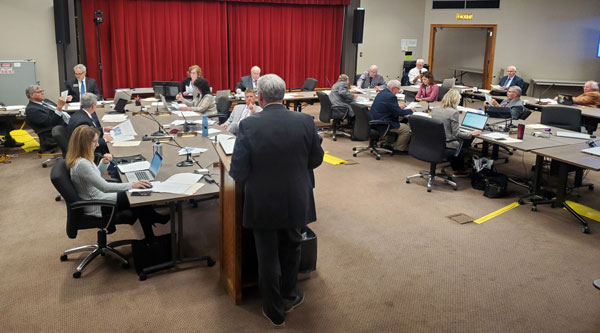Lawmakers Approve $100 Million for County Infrastructure Funding During Special Session
North Dakota legislators stayed on task during the Special Session by focusing on redistricting, appropriating the state’s share of $1.2 billion in American Rescue Plan Act (ARPA) funds, and tackling a few priority issues that have arisen since the 2021 Legislative Session. The five-day special session was fast and fluid.
Infrastructure Funding
Perhaps the most pertinent piece of legislation for counties was related to infrastructure funding. There were more than six variations of road funding scenarios that were discussed and discarded in a matter of days. In the end, the Legislature supported a plan to send $100 million of ARPA funds to counties for road and bridges. $80 million will be distributed to counties for use on roads or bridges based on the Upper Great Plains Transportation Institute (UGPTI) needs study formula. There is, however, a cap of $3 million per county. That carry over, $4.65 million along with the remaining amount, puts $24.65 million to NDDOT for grants to counties for county bridge projects based on an application process to be developed by NDDOT. You can access a spreadsheet illustrating how the $80 million for county infrastructure will be distributed here: https://bit.ly/countyarpa.
In addition to county road funding, it is important to note that highway infrastructure beyond counties also received a boost. The NDDOT received $200 million in ARPA funding, as well as $135 million in federal fund authorization should they be able to secure it. Townships received $17 million in ARPA funding, of which half will go out by road miles and the other half in equal shares to each organized and unorganized township in non-oil producing counties (>$5 million in GPT).
“It was amazing to watch the legislators address so many diverse funding needs and policy issues in less than five full days,” commented NDACo Executive Director Terry Traynor. “It is truly gratifying that they recognized the road and bridge infrastructure needs at all levels of government. These funds will ensure that the 2022 construction season can result in major improvements to our transportation system.”
Water infrastructure was dealt with in the “other ARPA bill,” SB2345. $75 million of ARPA was allocated for water projects, and it further created a structure (and $1 million) to establish a water stabilization fund for future biennia, which is to receive Resources Trust Fund dollars above projections. Other appropriations worth noting that will have an impact on our county members is $3 million for a remodel of the Law Enforcement Training Center along with funding for state agencies to purchase radios for the Statewide Interoperable Radio Network (SIRN).
Redistricting
While appropriating the state’s share of $1.2 billion in ARPA funds was a big portion of the work the Legislature focused on, the primary reason for the Special Session was to approve a new legislative redistricting plan. This is the first time since 1910 that North Dakota had grown by more than 100,000 residents in a decade. The Legislature approved a plan that holds at 47 legislative districts which were redrawn to hold approximately 16,500 residents, compared with about 14,500 residents in the past decade. You can view the North Dakota Legislative District map here: https://www.legis.nd.gov/files/district-maps/2023-2032/finalmaphb1504.pdf.
Delayed Bills
NDACo monitored several of the bills that were heard by the delayed bills committee. Among those that moved through the Joint Technical Committee and to the House and Senate for approval was HB1511, which addressed employer-required COVID-19 vaccinations, vaccine passports and limitations on requiring documentation of COVID-19 vaccinations, antibodies, and post-transmission recovery status. The bill allows for exemptions for the Department of Corrections, the State Hospital and local public health units from the ban, effectively arguing that these facilities need the authority to ask COVID status of employees and visitors in order to protect their workforce and those in or entering congregate settings. The bill further stated a business may mandate the vaccine but provided a long list of conditions to opt out, including exemptions already in place: underlying conditions that would put a person at risk if administered the vaccine, or for religious, philosophical or moral beliefs. Further amendments were made to protect businesses/entities that may conflict with state and federal laws when dealing with federal contracts or federal regulations, such as those receiving CMS payments.
Also, important to note was the Legislature’s approval of an income tax relief package which will provide an income tax credit of up to $350 per year for resident income taxpayers, or $700 per year for individuals filing jointly in tax years 2021 and 2022. The $211 million in tax relief will be funded from the state’s excess general fund balance from the 2019-21 biennium.
NDACo Executive Director Terry Traynor Testifies on county infrastructure needs
